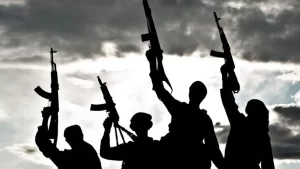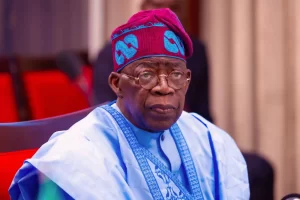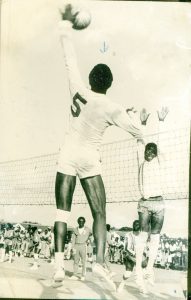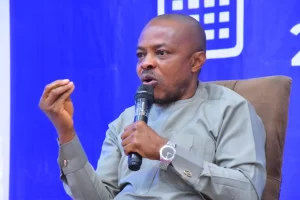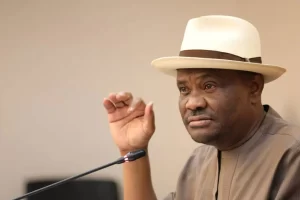FlashBack News: GENERAL BISALLA, 31 OTHERS EXECUTED IN LAGOS FOR THE ASSASSINATION OF MURTALA MUHAMMAD
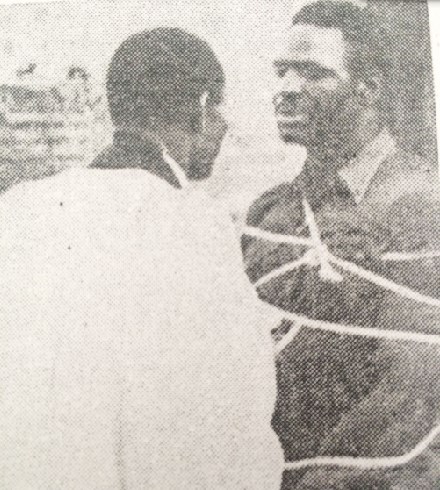
The crowd and the soldiers arrived at the execution venue at the same time. Some of the spectators had been trooping in since. They came with the first set of soldiers who had come to prepare the execution ground. At 4 O’clock, they would be shot. That was the news and no one wanted to miss the Bar Beach Show.
They wanted revenge. They wanted blood. The Nigerian public asked for nothing more, except the death of the plotters that killed their Head of State, General Murtala Ramat Muhammad. From the day of the coup (February 13, 1976), to this Thursday, March 11, 1976, the agitation for the heads of the killers grew daily. They must be killed too, and not in any hidden place. It must be in public. And they were not disappointed.
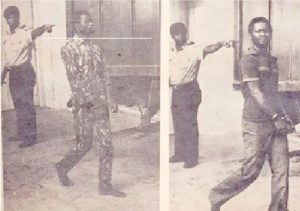
There were three musketeers the people wanted to see, badly too. They wanted to see Col Suka Buka Dimka dead in a hail of bullets. They would like to see Major General Bisalla in excruciating pains before his own death. They would pay, if the need arose, to see the agony in the face of a man called Abdulkarim Zakari. The three were the most notorious among the traitors.
Major General Bisalla was the Commissioner for Defence, and naturally, the man who was to protect the sovereignty and integrity of the nation and the seat of power from any internal or external attack, but he was named the patron of the coup and the head of state in waiting. He was a friend of Murtala, a course mate and a professional colleague of long standing. They sat together to plan the programmes of the Murtala government, and even after the botched coup, he was still participating in discussions as to the running of the affairs of the state under a new leadership. So, it was shocking when the truth came out, and Nigerians wanted him humiliated on his way to life beyond.
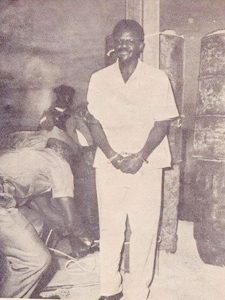

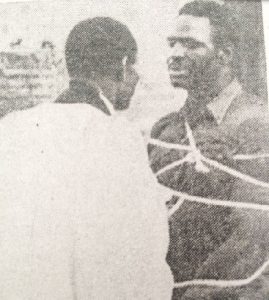
The most wanted man was Dimka. He was the man who led the assassins on Keffi Street, Obalende. Lagos and ambushed the Head of state before they opened fire on him, and the fact that he announced the coup on the radio, choosing the headquarters of the Federal Radio Corporation as his new abode. Before escaping into the Ikoyi cemetery behind it, his name had been synonymous with the coup, many Nigerians wanted to look him in the eyes, talk to him if they could, and watched him when he got the bullets.
Abdulkarim Zakari was not supposed to be there. He did not belong, for he was not a soldier. But he wanted to be counted along, probably as a good brother-in-law to Yakubu Gowon, the ousted head of state. So, he arranged how Dimka would get to the Radio House and make his broadcast. He was with him, showing him the technical know-how until the arrogant voice of the soldier hit the air. But for Zakari, it might have been very difficult for Dimka to announce his coup, and Zakari knew all this from the outset.
Others were there too, but their names were not as prominent as the three. The number however made them popular on the wrong side: 32 coup plotters to be executed, no one had ever heard of such number of soldiers to be shot in one day in Nigeria. And there was anxiety as many Nigerians wanted to know how the killings would go. It was the reason they rushed to the Bar Beach. It was the reason they waited patiently, even when the hands of the clock hit seven in the evening.
Now, the time was 7.15pm. The public execution of the first group of 32, who planned the coup, had been unavoidably delayed for well over three hours. Just then, there was a sound of a military jeep. And it appeared, screeching to an abrupt stop. There, it offloaded its contents: a lieutenant colonel and an escort. And the man shouted, soldier-like: “We are here now! We are about to start! The execution is going to start anytime from now! The coup plotters are on their way!” And the crowd yelled in one accord!

An observer would have thought the reason for jubilation by the crowd was that the coup plotters coming were to distribute some goodies to them, and that by the coming of the expected people, some gifts were to be carted away. But not so. Their jubilation stemmed from the fact that they were going to see the end of the enemies of the nation. Besides, it had become a sadness-and-joy of an event, a dramatic way of killing. And the excitement grew.
Some minutes later, the unfamiliar sound of siren rent the air. Then the Black Maria snaked in, and the condemned Nigerians were peeping to know where exactly the truck had stopped. One of them shouted, “It is the Bar Beach!” And the crowd responded in a louder voice: “Yes, you are right. Come down and let’s have a Bar Beach Show.” And there was dead silence inside the truck, for every one of them understood what a Bar Beach Show meant.
In those days, the Bar Beach was a place of merriment, where, every weekend, Lagosians and even people from outside the city, would go to catch some fun. Musicians would be there, dramatists would come, swimmers would entertain, and parents would bring their children to enjoy the sight of the surging wave of the ocean. It was the biggest and most popular place of jollification and it was tagged the Bar Beach Show. A programme was created on the Nigerian Television Authority to etch the name into the heart of the people. It was also called the Bar Beach Show, anchored by the late show biz impresario, Art Alade.
But immediately after the war, armed robbery became rampant in Nigeria, and the firing squad was introduced, Armed robbers caught, tried and found guilty were publicly executed. Babatunde Folorunso had gone that way, followed by Oyenusi and his gang and so many other robbers. And anytime they were about to be killed, people came to watch, just the same way they had fun on weekends at the Bar Beach. And to create a symbiotic relation, the robbers were also executed at the Bar Beach. And the execution was also tagged the Bar Beach Show.
So, it was no longer a laughing matter when the plotters heard they were now the objects of the show, because up till then, no soldier had been publicly executed by firing squad. And there was reluctance, none of the condemned men wanted to come out first, even the senior officers were moved back into the Black Maria.
It was a pathetic scene, not for the crowd looking for excitement, but for the men of power and students of history. These were powerful men of yesterday, now wet chicken, with no hiding place. The crowd surged forward, wanting to reach out to you at the about-to-be-killed men and to derive joy from the pains of the potters, for that would soothe their anger against them. They were moving so close to the Black Maria, and the military personnel themselves were confused
The Black Maria moved up close to the stake, for the temporary “safety” of the men to be shot could not be guaranteed if they were left to walk a few distance to the stakes. The stakes were only 15, which meant that the condemned men would be tied to the stakes twice. And after a few skirmishes, an army captain moved close with a sheet of paper in hand. The door of the Black Maria swung open, and he started reading out the names of those to be shot. He seemed totally unaware of the history he was making.
First to come out was Major-General Bisalla. Whatever the case is, a general will remain a general. He was in a grey French suit, and from behind the seeming calm of his look, one could read disbelief in the way his end had come.

The strong breeze of the Bar Beach lashed against his massive body, flying his French suit in all directions, making Bisalla look like a frightened helpless elephantine figure among small animals. He was soon tied, his back to the lagoon, against the background of ships waiting to berth as a result of excessive importation of cement by his ministry – an issue which should have engaged his full attention before his attempt to become the next ruler.
The rope with which he was tied was a tick one, and the soldier tying him was equally tick. Though Bisalla was whispering or soliloquizing, the soldier seemed not to pay any attention. Pronto, he finished what he was asked to do, and our man was firmly tied to the stake. He could neither turn his head nor use his hands; he was as good as dead. For a general, it was an irony of power.
After him came others, they alighted as they were called, moved out in a dispirited gait, and limped in shackles. They followed one another in their ranks: the military guys would respect one another till death. Colonel .A .D .S. Way, he was the next in rank to Bisalla. He too was followed by the lieutenant-colonels, four of them. Then the majors: Six in all. Six captains fell in line, then the lieutenants, followed by three WO 11 and many sergeants.


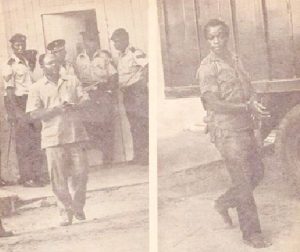
Major Ola Ogunmekan was in a leaf-coloured French suit, looking bulky and most unkempt, even his smiles looked dirty. He had just got married about a year before, and the society wedding was the talk of the town for many months. Now, the new groom was to be shot, and the bride was to become a widow.
The most pathetic picture was Abdulkarim Zakari’s. He looked so petit and frightened. He could have disappeared into thin air. Actually, he preferred to disappear, rather than face the barrel of the gun. He just wanted to die, he liked to die, but he didn’t like the firing squad. His legs apparently giving way under his slight figure was a scene to behold; and he gave himself out that he was the only civilian among the lot.
He was until his arrest a senior employee of the Nigerian Broadcasting Corporation (NBC) in Lagos, and not only that, he led Dimka and the other dissident into the studios on the fateful day. Zakari was the man who signed for martial music records from the NBC library the previous night. These were the records the rebels played while they were in charge of the studios.
Now, the first set – 15 of them – had been tied, all they were waiting for was death. Then came the clerics, one alfa was going round some of them who claimed to be Muslims, praying for them. And reverend fathers were also around, just telling them to confess, and that Jesus would take the rest of their sins away. And some eagerly confessed, hoping to escape from hell to heaven. For, indeed, most of them knew they were hell bound.
The soldiers, however seemed to be impatient of this plot to smuggle the coup plotters out of hell, and make them candidates for heaven. So, as mallams and reverend Fathers were moving up and down, a solitary officer’s voice boomed, ordering the executioners to come out. And they rushed forth, 16 of them, in combat readiness, with all the paraphernalia of a warrior. They marched briskly up, one in front of each condemned man.
After all the military rituals, it was time to cork and shoot. General Bisalla could be seen staring straight at the soldier in front of him, and into the barrel of the gun. His unbelieving eyes glared into that barrel, his brain seemed to be imagining his days, what could a soldier of that rank would ever have dared to do near him. But that brought home the folly of his deed.
And the final order came: Shoot! The crowd echoed the order as they surged forward in their thousands, chanting “Shoot! Shoot! Shoot!” With this background chorus, the volley of pellets slid out of the soldiers’ magazines, they were the pellets of death, death by fire!
Bisalla’s massive figure was immediately defined in blood, everything on him became red, and he could hardly be recognized again. Major Ola, despite his bulky trunk, could not hold on, he got folded half way, his head dropping past his knees. Major Kasali seemed to have mysteriously lost his legs, and Zakari fell through the ropes, he scattered on the ground.
The crowd would not go, they continued to ask for more shots, until the others were tied and shot in their presence. And they started another song, Where is Dimka? Where is Dimka? Give us Dimka! Give us Dimka!
And the days of the Dimka show was very near, for what happened on the 11 March 1976, was just the first round, the second round was on the way, and it featured the most wanted Dimka.
These were the names of those executed for the assassination of General Murtala Muhammad. They were shot at the Lagos Bar Beach on March 11, 1976:
Major General I D Bisalla
Col A. D. S. Wya
Lt. Col. A. R. Aliyu
Lt. Col. Tense
Lt. Col A. K. Adamu
Lt. Col. A B. Umoru
Major C. D. Dabang
Major J. W. Kasai
Major I. B. Rabo
Major K. K. Gagara
Major M. Msheila
Major Ola Ogunmekan
Captain M. Parwang
Capt J. F. Idi
Capt S. Wakias
Capt A. A. Aliyu
Captain Augustine Dawurang
Capt. M. R. Gotip
Lt. Muhammed
Lt. E. L. K Shelleng
Lt.William Seri
Lt. O. Zagmi
Lt. S .Wayah
Lt. Peter Cigari
WO 11 Monday Monchong
WO 11 Sambo Pankishin
WO 11 Emmanuel Dakup
S/Sgt. Richard Dungdang
Sgt. Sale Pankshin
Sgt, Ahmadu Rege
Sgt. Bala Jawan
Mr AbdulKarim Zakari
Captain Peter Temlong was found guilty and sentenced to life imprisonment.
